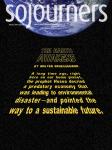SHORTLY AFTER THE November mid-term elections, Pope Francis officially launched a campaign of his own—although one with a decidedly different tone than that of most politicians. Dec. 8 marks the start of the “year of mercy,” which in Francis’ words is a chance for the church to consider how it “can make more evident its mission of being a witness of mercy.”
This challenge is not one that seems to have taken root in our political conversation, and I’ve seen little evidence of it in the presidential candidate debates. In a year when we will democratically elect a leader of one of the most powerful nations in the world, how will mercy figure into the strategy?
Specially designated “jubilee years” are a Christian tradition that began in the early 14th century, based on the biblical mandate in Leviticus 25 and Jesus’ call for the “year of the Lord’s favor” in Luke 4. In the Catholic tradition, jubilee years serve as calls to grow in one’s relationship with God through prayer, blessings, and penance.
Of course, calling this time a year of mercy doesn’t mean that it’s the only year we are called to focus on mercy; rather it is an effort to get the church and the world to consider the quality of mercy more closely, more deeply, so it permeates our daily lives and influences our actions. (Like a New Year’s resolution that actually sticks!)
Pope Francis’ document announcing the jubilee year was addressed not only to Catholics but “to all who read this letter.” He urges us all to view the year as a time to recommit to the corporal works of mercy laid out in Matthew 25—acts such as feeding the hungry, sheltering the homeless, and visiting the imprisoned—and to prayer and reconciliation. Francis wants to make clear that God’s mercy is available to all and all are called to participate in such acts.
This universal call to service and reconciliation is particularly apt during a year that also holds a U.S. presidential election. Most of us simply endure the discouraging arguments among politicians or candidates tearing each other down while glossing over their own shortcomings.
Could the year of mercy offer a way forward in our national political conversation? Although it won’t likely come up during the debates, this call for true introspection, for repentance of sins both personal and systemic, is one our nation’s leaders and prospective leaders could take to heart.
“A good political leader is one who, with the interests of all in mind, seizes the moment in a spirit of openness and pragmatism,” Francis told Congress during his visit to the United States. “A good political leader always opts to initiate processes rather than possessing spaces.”
A commitment to mercy can lead to true dialogue and to the sort of open and honest conversations our nation needs to overcome our often-fractious politics. Repeatedly during his visit last fall, Francis emphasized the importance of dialogue. While addressing Congress, he held up the Trappist monk Thomas Merton, calling him “a man of dialogue, a promoter of peace between peoples and religions,” and called for dialogue between “countries which have been at odds.”
In speaking with Catholic bishops about leadership, Francis reminded them that “dialogue is our method, not as a shrewd strategy but out of fidelity to the One who never wearies of visiting the marketplace, even at the 11th hour, to propose his offer of love.” He described dialogue as “the path ahead,” one that requires “courage and daring.”
The year of mercy is an opportunity. It calls all people to true engagement with each other, so that we might more closely emulate the love of God, who always thinks in terms of covenants, not campaign promises.

Got something to say about what you're reading? We value your feedback!

